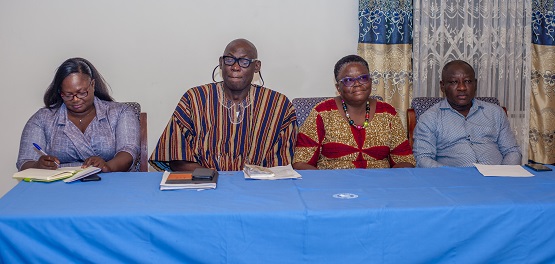
Ms Kpan (second from right) with other speakers at the meeting
The officer in charge of girl-child education at the Ghana Education Service (GES) in the Upper West Region, Ms. Janet Kpan, has appealed to parents to provide sexual and reproductive health education (SRHE) to their children to prevent them from seeking the knowledge from their friends and peers.
Many parents, she said, had left the SRHE to only health workers and other stakeholders, including unqualified individuals such as their children’s peers, who mostly shared very unwholesome information with their colleagues.
She could not fathom why parents found it difficult to discuss reproductive health issues with their wards and shied away from mentioning the names of private parts and certain basic issues such as menstruation in front of their wards.
Ms. Kpan said this at Wa during a stakeholders’ meeting on sexual and reproductive health organised by youth advocacy groups on “Informed Choices for Change” (IC4C) in the Upper West Region at the behest of Norsaac, a Tamale based non-governmental organisation.
“Parents gave birth to the child; what education are they giving them on their sexual health? Most parents find it very difficult to give such education to their wards, but the child needs to know that when she begins to grow breasts, it is a sign of maturity, which will be followed by menstruation, at which point sleeping with a man could make her pregnant,” she said.
He indicated that boys also needed to know that early sex could
make them premature fathers and also cause them to acquire sexually transmitted diseases and infections (STD/Is).
“Most of our children in school are sexually active, and we must come to terms with that fact so that we can prevent them from indulging in early sex with its implications,” she said.
Ms. Kpan explained that to help protect the girls, the GES was working with health professionals who had been trained in that regard to create adolescent corners in some of the senior high schools to provide SRHE services to the students.
“Sex education in schools is helping to enlighten the young ones on how to abstain from sex if they want to avoid STD/Is and how to use condoms if they cannot abstain, but GES preaches abstinence to avoid pregnancy and other issues,” she said.
She indicated that educating adolescents on reproductive health and socio-cultural responses would enable them to understand their biological makeup as well as that of the opposite sex, and this, according to her, would help them develop themselves and avoid questionable bahaviours.
“Adolescent reproductive health issues are multifaceted and necessitate collaboration of various stakeholders in health, education, social welfare, media, religion, as well as women’s and children’s groups, among others,” she explained.
This, she said, would enable the stakeholders to achieve improved responsible sexual and health behaviour among adolescents and also offer the young ones the opportunity to learn more about transitioning from childhood to adulthood.
From Lydia Darlington Fordjour, Wa
